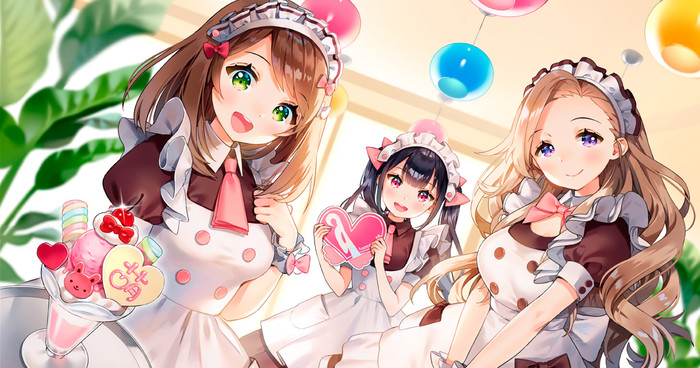Maid Cafés Aren't Just For Male Otaku Anymore
by Kim Morrissy,For anyone with a keen interest in anime subculture, the maid cafés of Akihabara need no introduction. Despite their ubiquity in anime, however, they feel representative of a previous generation of otaku, with their emphasis on “moe” (a word people don't really say anymore) and cheerfully cheesy displays of servitude.

Yet unbeknownst to many, maid café culture has been undergoing a sea change in the recent COVID years. Existing establishments have been enforcing social distancing and refurbishing their interiors to comply with safety guidelines. And in these updated, squeaky clean cafés where masks are the norm, new kinds of customers have been flocking to enjoy the food and atmosphere.
These days, I'm told, the number of female customers has surged.
“The ratio is pretty close to equal,” says Chimu, a maid who works for the at-home cafe in Akihabara, which prides itself on providing the “traditional” maid experience. “It's changed a lot in the past few years. Now there are many young ladies (ojо̄-sama) who come to enjoy the atmosphere. We try to serve every master (goshujin-sama) and young lady equally to bring smiles to their faces.”
In certain ways, maid subculture was in a prime position to take advantage of new dining trends in Japan. As social media platforms like Instagram and TikTok soared in popularity, so too have cutesy-themed cafés in general. These novelty food experiences are particularly popular among young women, who often attend in groups and share photos of their outings on social media, providing the crucial word of mouth needed for dining establishments to survive in the COVID era.
The menu at the at-home cafe is dressed up in just the right ways to make the perfect Instagram photo: you can order personalized art for your coffee or omurice, and the desserts are crammed with bright and colorful sweets. With the maids on standby ready to channel their “Moe Moe Kyun” energy into your dish of choice, it's clear from the outset that you're ordering not just food but an experience.

Although not an orthodox maid café, at-home maids also serve as waitresses at Sanrio's Pompompurin Café in Harajuku, which is more conventionally aimed at female consumer tastes. Before visiting the Akihabara branch, I dropped by this café as well to observe the maids in action. The girls were in their element, eager to chat about their favorite Sanrio characters and revel in the cute atmosphere.

Despite the changing face of the at-home cafe business, the maids at the Akiba Cultures Zone store tell me that they have never felt the need to change their approach to service over the years. It has always been their personal policy to be welcoming and inclusive to everyone who visits the store.
“For me, service is about making a person feel at ease,” Chimu explains. “In whatever small way I can, I want the people I serve to be able to look back on their day with a smile.”
The appeal sounds similar to idols, so I ask the maids what they think. After a hum of thought, Chimu says, “They might seem similar on the surface, but it's different when you get into it. Idols are performers, and they bring happiness to others by doing their best from a distance. Although maids can sing and dance too, our work is performed on a face-to-face level. We tailor our service to the individual.”

In other words, a maid's work isn't just about performing ritualistic lines or routines. As long as the conversations are kept within polite and professional boundaries (e.g., no exchanges of personal contact information), the maids are willing to chat with their customers about pretty much anything.
“A lot of our female visitors ask us for love advice,” a maid named Mitsuba tells me. “We talk about all sorts of things, like work or study-related problems. We sometimes get asked for advice on doing makeup and things like that.”
I could understand that. Maid subculture might be niche, but it's not just male otaku who are attracted to the “kawaii” aesthetic, after all. Seeing a professional maid up close is eye-opening from a female perspective as well, and can inspire a powerful realization of “Oh! This girl isn't so different from me! I can become cute like this too!”
For the traditional maid café clientele, the appeal of maids hasn't changed since the initial boom over a decade ago. For instance, you can still pay money to get a polaroid of yourself posing next to a maid. Considering how far camera phones and selfie culture have progressed, this feels like a quaint throwback. But the at-home cafe is also transitioning into the modern livestreaming age; two years ago, it launched a virtual café counterpart. The idea is for customers to experience the traditional maid services even from home.

Mitsuba, who handles a chunk of the virtual café duties, tells me it's a lot of fun but also a lot of work. “I really have to think about my voice to make sure the atmosphere can come across even through the virtual avatar.” She also tells me that the appeal is different from virtual idols and streamers like the hololive performers. Customers can order one-on-one face time with the maids in half-hour blocks; it's a system that can be enjoyed at leisure, without striving for mass exposure in the increasingly crowded streaming ecosystem.
Like many establishments that sell a social experience, maid cafés initially struggled with social distancing. at-home was one among several chains to report COVID infections in mid-2020, sparking worries that the maid café phenomenon might have finally run its course. Akihabara's landscape is completely changed these days, with many iconic electronic stores and arcades closing their shutters for good in the midst of dwindling business. When the tourists finally return to Akihabara after the pandemic, they'll be surprised at how different everything is.
Yet when I visited the physical at-home café in February, I was surprised by just how popular and lively it was. Maid cafés aren't down and out yet; they continue to deliver the old-school fun in a rapidly changing world. And the experience is more refined and inclusive now than ever before—the maids even take English classes to better serve their foreign clientele. Maid cafés aren't just for male otaku anymore. They're for everyone.
discuss this in the forum (12 posts) |